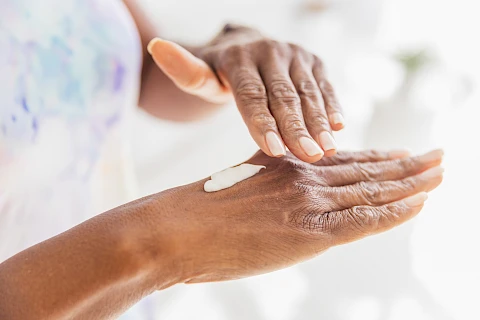
Natural changes in the skin become more pronounced as we age, often leading to unique dermatological concerns for seniors. Maintaining skin health is essential for overall well-being as the skin is our body's first line of defense against viruses and infection. Senior Helpers has created this guide to empower caregivers with essential knowledge and practical strategies to maintain and enhance skin health for seniors. The goal is to ensure senior skin remains resilient, supple, and healthy.
What to Know About Senior Skin Health
The skin naturally loses its elasticity and becomes thinner as we grow older. This leaves seniors more susceptible to skin issues, including dryness, bruising, and pressure sores. Monitoring skin health is crucial as it can be a window into overall health conditions. Regular skin check-ups help caregivers keep a close eye on any changes and facilitate early treatment of potential issues.
There are several things caregivers can do to help protect sensitive senior skin. Here are a few to consider:
Gentle Cleansing
Less is often more when it comes to cleansing aging skin. Aggressive scrubbing or harsh soaps strip the skin of its natural oils, leaving it dry and vulnerable to irritations or infections. Caregivers should opt for gentle, fragrance-free cleansers designed for sensitive skin. A warm washcloth can be used to softly remove the cleanser and preserve the skin's natural moisture.
Moisturizing
Just as plants need water to thrive, senior skin needs hydration to maintain its health. Regular moisturizing nourishes the skin and also forms a protective barrier against environmental factors. Caregivers should look for hypoallergenic moisturizers containing ingredients like hyaluronic acid and ceramides, which aid in retaining moisture. An optimal moisturizing routine would include application after bathing and before bedtime.
Sun Protection
Sunlight, while important for vitamin D synthesis, can be harmful to the skin, especially with excessive exposure. Because a senior's skin is thinner, it is more prone to sunburn, discoloration, and skin cancers. An appropriate sun protection routine should include wearing hats or protective clothing, staying in shaded areas during peak sunlight hours, and applying sunscreens with SPF 30 or higher. Remember that sun protection is necessary even on cloudy days as harmful UV rays can penetrate cloud coverage.
Identifying and Addressing Common Senior Skin Issues
Early identification of skin issues is essential in the successful management of skin health in seniors. Signs of dryness include itching or flaking, and this can be combated with regular moisturizing and by avoiding hot baths. Increased fragility can also lead to easy bruising. Ensure that senior living spaces are free from clutter to prevent falls and injuries.
Pressure sores or bedsores are common among bedridden seniors and can be identified by red, sensitive skin areas. Pressure sores require professional medical attention as they can lead to serious infections if not treated properly.
Senior Helpers Can Help Seniors Maintain Healthy Skin
Senior Helpers is your most trusted name in quality in-home senior care services. If you live in the Hollywood, Fort Lauderdale, or Broward County areas, don't hesitate to contact us anytime at Senior Helpers Broward County. Our team of carefully trained professionals is ready to provide the best care to your seniors at home, including helping maintain the healthiest skin for your loved ones.